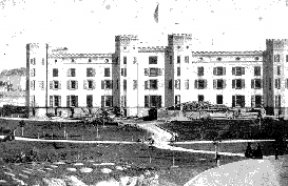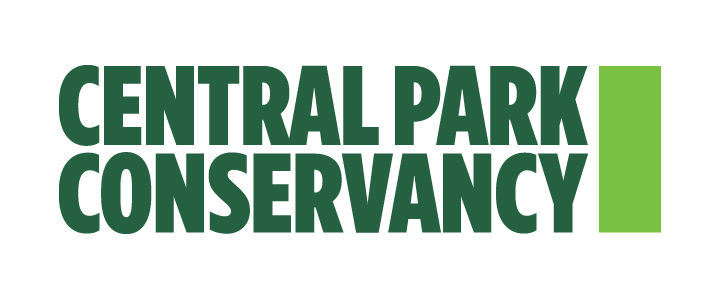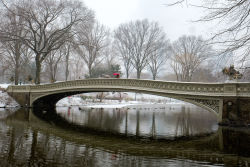Central Park
The Daily Plant : Thursday, June 10, 2004
GLIMPSES INTO THE ARSENAL’S FORGOTTEN HISTORY

Anyone who visits or even passes by the Arsenal in Central Park gets some sense of its historical status. Closer examination of the building will confirm historical suspicions: the basement entrance bears New York City and National Landmark designation plaques. The most thorough examiner will notice the Arsenal’s dedication stone, high above the door, inscribed with the building’s original construction dates: 1847-1851. Just to the north of the entry stands the historical sign for the building. The curious observer can pay a visit to the Parks Library, to pick up a brochure with an extensive Arsenal history. Nevertheless, none of these sources contain the Arsenal’s "forgotten history."
As a consequence of doing extensive research on the history of the Arsenal’s lobby (especially its chandelier) for a planned renovation, Parks Librarian John Mattera and the Historic House Trust’s Curator, Sandra Huber, uncovered some historical tidbits that range from intriguing to hysterical. Most of this "unearthed" information came from the New York Times, every issue of which, (1851 to the present), has been digitized and made available to anyone who visits the New York Public Library in Bryant Park. It’s truly an amazing feat of technology, and reading the old Times stories reminds the reader how much things have changed over the years, from writing styles to the nature of journalism, and even what the public wanted to read.
One news item from 1896 explained that Johanna, a chimpanzee who lived in the Arsenal zoo, would soon be moved. On face value this fits with our preexisting understanding of the Arsenal’s history. Many Arsenal employees working in the basement have heard stories of the days when their offices were cages for the zoo animals or horse stalls for the Police precinct that were once housed here. But contrary to our common understanding that the animals lived only in the basement and were removed by 1871, this article describes a different story. Johanna had, not a cage but "quarters" on the second floor of the Arsenal, where she lived for two years. Her move was necessary because Parks Board of Commissioners needed the space she occupied to build an office for the Parks Superintendent. Justifying the beloved chimp’s move, one Commissioner explained "it retards and hinders business to have to communicate with the staff who are on another floor by speaking tubes or messenger." Although communication technology changed a bit over the past 108 years, the lack of space in the Arsenal seems to be an enduring condition. In the last line of the piece, the Times explained that already the bookkeeper had been working at a desk only inches away from the glass partition to Johanna’s "apartment." Readers were asked to take note of the chimp’s new post office address, but it’s unclear whether Johanna wrote her own replies or routed them to the staff.
Although the Arsenal contained Parks Department offices for most of its history, the preponderance of news relates to the building’s uses as a zoo, museum, police station, and weather station. A December 6, 1902 account reported that a fire broke out in the boiler room, and that a policemen in the locker room managed to stop the spread of the flames. One third of the article addresses the readers’ assumed concern regarding the well-being of the lions who also occupied the basement of the Arsenal. This passage conveys the high level of concern New Yorkers had for animals, and the era’s slightly exaggerated perception of animal intelligence. The reporter apparently felt the need to explain in length how the lions were far removed from danger, and in his closing line he reported, "The animals, it was said, did not know that there had been a fire until informed of the fact by their keepers at the luncheon hour."
Before Robert Moses arrived on the scene in January 1934, to renovate the building and rebuild the zoo, the Arsenal—the site so many consider the enduring seat of Parks’ power—was a neglected public building that had two close calls with demolition and an ever-changing cast of characters. In large part these stories are not a part of Parks & Recreation’s official history, and have been relegated to the annals of the Arsenal’s forgotten history.
Written by John Mattera
QUOTATION FOR THE DAY
"Sharing food with another human being is an intimate act that should not be indulged in lightly."
M. F. K. Fisher
(1909-1992)
Check out your park's Vital Signs
Clean & Safe
Green & Resilient
Empowered & Engaged Users
Share your feedback or learn more about how this park is part of a
Vital Park System

Know Before You Go
Anticipated Completion: Spring 2024
Anticipated Completion: Spring 2025

Contacts
Central Park Information: (212) 310-6600
Central Park Information (for the Hearing Impaired): (800) 281-5722
Belvedere Castle, The Henry Luce Nature Observatory: (212) 772-0210
The Charles A. Dana Discovery Center: (212) 860-1370
The Dairy Visitor Center and Gift Shop: (212) 794-6564
North Meadow Recreation Center: (212) 348-4867
Loeb Boathouse (Bike rentals, boat rentals & gondolas): (212) 517-2233
Carousel: (212) 879-0244
Fishing at Harlem Meer (Catch & Release): (212) 860-1370
Harlem Meer Performance Festival: (212) 860-1370
Horseback Riding - Claremont Stables: (212) 724-5100
Metropolitan Opera (Performances on the Great Lawn): (212) 362-6000
New York Philharmonic (Performances on the Great Lawn): (212) 875-5709
Shakespeare in the Park - The Public Theater at the Delacorte Theater: (212) 539-8655
Central Park SummerStage: (212) 360-2777
Swedish Cottage Marionette Theater: (212) 988-9093
Tennis: (212) 280-0205
Weddings, Ceremonies and Photography at the Conservatory Garden: (212) 360-2766
Wildlife Center & Tisch Children's Zoo: (212) 439-6500











